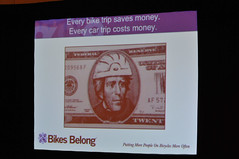Tim Blumenthal of Bikes Belong (an industry-backed, non-profit bike advocacy group) helped kick things off here at the 2011 Oregon Active Transportation Summit in Salem today by sharing a presentation titled, 12 Trends That Will Help Bicycling Grow.
Here’s the list:
- Bike sharing systems linked with infrastructure investment: “It’s a promising trend and a trend that’s coming to cities in your state too.” (News to me. Maybe Tim’s in on a secret?).
- Stronger commitments from government officials and more urban bike trips: “There’s no substitute for great support from Mayors.”
- More expensive gasoline and population growth: “A more realistic, higher price of gasoline is definitely in the interest of bicycling… The U.S. right now is 312 million people or so… We’re heading toward 400-450 million. Regardless of highway investment, we won’t be able to build our way out of congestion.”
- Cyclovia/Sunday Parkways/Open Streets events
- Every bike trip saves money. Every car trip costs money
- Converting car parking to bike parking
- Tax incentives for bike riders and bike-friendly businesses
- The 60% who are interested, but concerned
- Bikes and equipment that are specifically designed for shopping and short trips: “Anything we can do to make those short trips more practical and possible is a great thing.
- People for Bikes: The national signature gathering campaign launched by Bikes Belong two years ago now has over 200,000 names.
- More childen on bikes: “Safe routes to school for kids are safe routes all day, every day for everybody.”
- Bicycling is at the center: a global solution
Nationa








Thanks for reading.
BikePortland has served this community with independent community journalism since 2005. We rely on subscriptions from readers like you to survive. Your financial support is vital in keeping this valuable resource alive and well.
Please subscribe today to strengthen and expand our work.
I wonder what percentage of the 60% that are “interested but concerned” are actually “interested but too lazy and use safety concerns as a scapegoat”.
I’m not sure it matters. Calling them lazy doesn’t get them out of their cars and we need them out of their cars. Some portion are concerned for reallies and if make it safer, they’ll get on bikes. Then we can do the surveys again and tackle the lazy ones.
Recently, I met and talked with a young guy that works for the city of Beaverton as an engineer. Person lives in Tigard, and is interested in biking…knows about the Fanno Creek Trail and the Lombard St bike lanes as route options for commuting to work by bike…but said they didn’t ride because, being from a small town (another part of the state.)…they were afraid of riding in city traffic.
Nice person, but I was very surprised that they would think of routes from Tigard to Beaverton, as this threatening.
You nailed it!! The status of” interested but concerned” is a huge catch bucket for excuses. The term should set off a BS alarm any time it is used by planners or designers.
Thats exactly what I was thinking when I read the comment.
Point is, the act of dismissing people represented by the ‘interested but concerned’ description, as “interested but too lazy… (that use…) safety concerns as a scapegoat”, miserably fails to recognize real factors that discourage people from cycling rather than getting into their car to drive the trip instead.
For highly motivated, experienced, well conditioned, traffic savvy cyclists, a trip through town can be an exciting challenge.
For someone that’s not particularly a cyclist, but that’s receptive to the idea of using a bike for short trips here and there, having their fragile bodies exposed to motor vehicle traffic as they sit perched atop a bike, can be quite a deterrent to riding.
I’m not dismissing all of the 60%, just pointing out that we will never get all of that 60% to join in, regardless of the infrastructure.
We just need 1/3 of them to regularly cycle to change the very nature of our cities. So I say focus on them.
You’re not dismissing them? Didn’t you write: “… too lazy and use safety concerns as a scapegoat”. …” ?
Laziness isn’t necessarily the reason people aren’t riding. Natural fear of riding in regular lanes and bike lanes inadequately designed into roadways…motor vehicle dominated…roadways, has something to do with people being discouraged from riding.
That’s what the city planner was effectively saying to me about his own reluctance to ride. This guy had what many people would consider to be a better than average nice, relatively safe route for biking to work. Still…he felt uneasy riding, because of having to mix it up with car traffic in places on his route.
As motor vehicles become ever more seductively inviting to travel within, it’s going to take lots of imagination and effort to attract people away from them and to the idea of substituting a bike for a car to meet their travel needs.
Even though a driver might get stuck in a traffic jam as they sit in their vehicle, the vehicle provides them with many of the comforts of home. Bike travel is likely to never rise to that level of sybaritic comfort… which may actually be fine with many of these people we hear about…people that would be more likely to consider riding instead of driving, if biking wasn’t so much of a ‘heart in the throat’ experience for them.
I said that I’m not dismissing ALL of the 60%. Come on. Reading comprehension…
Laziness will take away a decent chunk of the 60%. We can make cycling as nice as we want, but there are still people that take the elevator up one floor instead of using the stairs. I don’t think you will see them on a bike. At my workplace (manufacturing company) there are 10 of us that commute by bike, out of 1,500. I would say that 50% of the workforce here is either physically or mentally incapable of commuting by bike, for various reasons.
“I said that I’m not dismissing ALL of the 60%. Come on. Reading comprehension… ” Chris I March 30, 2011 at 6:31 am
The point is, that your first inclination appears to be to readily dismiss people represented by the ‘interested but concerned’ category, as “… too lazy and use safety concerns as a scapegoat”. Now you’re trying to evade the response to having done so, by noting that your remark includes questioning what percentage of people in that category fit your speculation.
The people you want to identify by a percentage, fall within an entirely different category. People that are simply too lazy to ride a bike instead of sit in a car, or “…use safety concerns as a scapegoat…” (actually, now that I think about that line, I’m not sure it’s exactly clear what you’re suggesting with it.), are not ‘interested but concerned’. The people in this latter category do not want to ride a bike. They of course, will not pass up any excuse not to have to make as much as a single revolution of the pedals on a bike.
Forget about them for the present. Focus on people repesented by the ‘interested but concerned’ category, that have the inclination to give cycling a try. Respond to reasonable concerns they have related to safer cycling within the motor vehicle dominated road infrastructure. This is important towards overcoming fundamental barriers that keep them from setting aside the car, at least on occasion for trips made by bike.
All are excellent points/trends, but one wonders how much protesting and donation cutting to which Detroit and the car makers will subject government officials. Or maybe car makers don’t have as much pull as they once did before the big bailout. I’m not sure.
We can wonder. Or we can try to bring more pressure to bear. They have committed people trying to make the political environment more conducive to their interests, we have committed people trying to make the political environment more conducive to our interests. They have money. But we’re right. So, I think it’s a fair fight.
LOL, do you actually think the bike lobby in the US can muster enough power and support to challenge the auto/highway lobby in any sort of meaningful way?
Well, we are not going to chane it by lol, burr…
Loving the bike helmet on Alexander Hamilton.
Wait, that is Andrew Jackson… but yes… Old Hickory looks better in a bike helmet.
In the short run, no. But in the long run I’m with Allison: we’re right, or, put another way, the circumstances that have for so long encouraged cars to be the logical choice of how to get around are not long for this world. Time’s running out for the automobilists. The 20th Century is almost over.
The efforts outlined above are salutary and some are even wise, but in the short run what matters most is that many folks already know in their bones–though they may not want to admit it–that the old way of getting around isn’t going to remain viable much longer. What we need to do is show the concerned folks how viable the car-free life already is right now.
Needed: local legal and employer support for biking employees.
Something akin to NYC’s “bikes in buildings” law revamp in 2009.
The trickle of rain beats down the mountain. We win over and convert by doing. My neighbor just bought commuting gear (rack lights etc,) for her bike to ride to work and now a girlfriend of hers wants to buy a bike & start riding to work. One revolution at a time……
The Earth is dying with 7 billion people. What do you think the planet will look like with 9 billion? How about 15 billion? No amount of bikes lanes is going to stop that kind of destruction. At this point, bringing more children into this world is simply ecologically irresponsible. Even animals know when not to breed for the sake of the survival of its species.
did you see the discussion above about the downside of calling people lazy? While I absolutely agree with you, I don’t think calling people irresponsible breeders is likely to win the hearts and minds…
but you’re right, of course.
Make it easy. Make it fast. Look good doing it and people will ride. Cool looking functional commuter machines, covered parking at grocers, workplaces, etc., low traffic bike boulevards and it’ll all work out. While racing kit is excellent technology for intensity on the bike, roll in wool, roll in tweed, roll in what you got and people may consider us, as in them too, as all of us… we. Change the paradigm from us and them to just all of us living in the city.
Sorry… too much Kombucha perhaps…bicycleriiiights
Put a bird on it…
+1 on make it cool. If it’s cool, teenagers and young adults will do it. If young people are doing it, mid-life crisis sufferers will do it. If parents are doing it, their kids will have bikes that didn’t come from a department store. If a kids bike is in good shape, she’ll want to ride it more. If kids are riding more, the huge costs of vehicle ownership will be even less appealing as they reach legal driving age.
Then there’s just old people. I’m betting those who choose active transportation will typically outlive those who don’t so that group pretty much takes care of itself.